Are back-to-school preparations getting down to the wire? We at Infobase are happy to help. If you’re looking for resources to help teach critical-thinking skills and history for this year’s classes, we’d like to introduce you to two of our most beloved products: Issues & Controversies and Issues & Controversies in History. Perfect for in-class debates, these two acclaimed resources present both sides of major conflicts in world history and today.
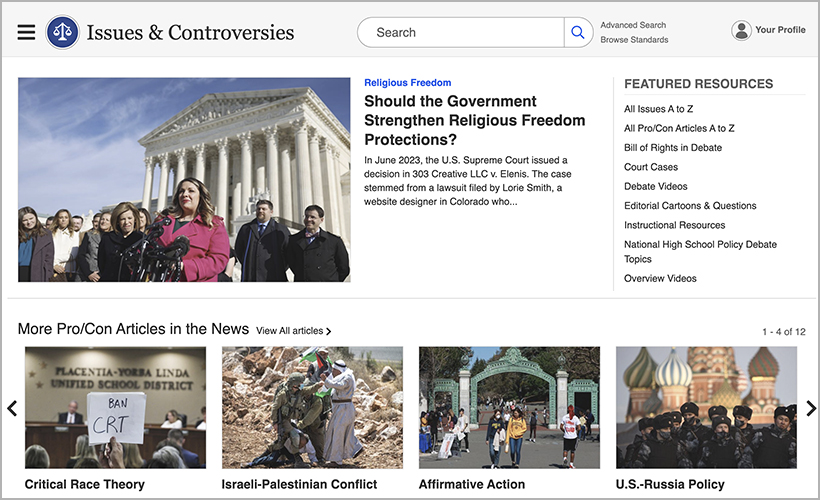
Ideal for getting students to think critically about today’s most important issues, the award-winning Issues & Controversies provides objective, in-depth analysis of hundreds of today’s hot topics in politics, government, business, society, education, and popular culture. Issues & Controversies in History is known for its dynamic, concise, and balanced coverage of major debates and conflicts in every region of the world from antiquity to the present. It contains authoritative articles on topics that will capture students’ attention and encourage discussion throughout the academic year.
We’ve made it easy for educators to use these tools in classes by highlighting a selection of articles on key topics they may be teaching about, organized by month.
Ideas for Using Issues & Controversies
- Use the overview videos–available on most major issues–to introduce a topic
- Use the discussion questions to spark in-class debate
- Use the Enhanced Lessons to find lesson plans for teaching controversial subjects
- Use the debate videos to provide fresh perspectives from leading experts
- Use the printable handouts for review and self-assessment
- Read the primary sources for context and background
- Get students thinking with the “What If?” questions in the “Extend the Lesson” section
September:
- Labor Day: Labor Unions: Do Labor Unions Benefit American Workers and the U.S. Economy?
- September 11 attacks: Travel Ban and Immigration: Should the United States Ban Travelers from Certain Countries?
- National Childhood Obesity Month: Childhood Obesity: Should the Government and Medical Community Take More Aggressive Action to Combat Childhood Obesity?
- National Food Safety Education Month: Food Safety: Should the U.S. Government Strengthen Food Safety Regulations?
October:
- National Bullying Prevention Month: Bullying: Should Congress and State Governments Pass Laws Requiring Educational Institutions to Implement Anti-Bullying Measures?
- Banned Books Week: Critical Race Theory: Should States Restrict Discussion of Race in the Classroom?
- Energy Action Month: Climate Change: Should the U.S. Government Take Aggressive Steps to Combat Climate Change?
- National Substance Abuse Prevention Month: Opioid Epidemic: Should the Government Take More Aggressive Measures to Address the Opioid Crisis?
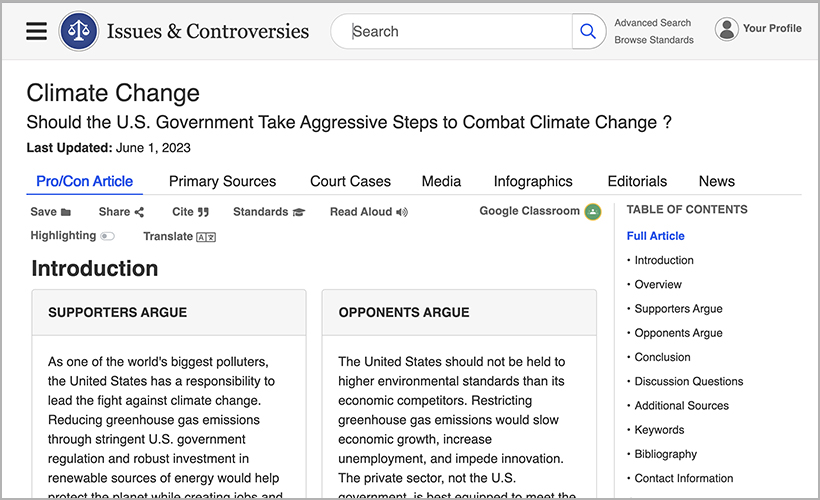
November:
- Native American Heritage Month: Native American Policy: Does the Native American Reservation System Work?
- Homelessness Awareness Month: Involuntary Commitment: Should the Government Involuntarily Commit More People with Severe Mental Illnesses?
- Election Day: Voting Rights: Should Congress Pass a New Voting Rights Act?
- Veterans’ Day: Afghanistan War: Was the United States Right to Have Withdrawn from Afghanistan?
- Transgender Awareness Week: Transgender Rights: Should the Government Take More Steps to Protect Transgender Rights?
December:
- National Impaired Driving Prevention Month: Drunk Driving: Should the Government Employ More Aggressive Means of Preventing Drunk Driving?
- Human Rights Day (December 10): Human Rights: Should the United States and the International Community Intervene to Protect Human Rights?
- Christmas/Hanukkah/Kwanzaa: Religious Freedom: Should the Government Strengthen Religious Freedom Protections?
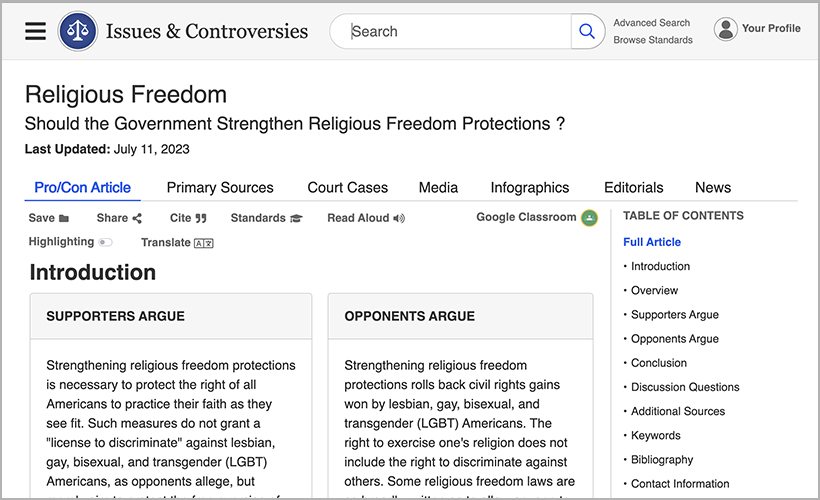
January:
- National Slavery and Human Trafficking Prevention Month: Slavery Reparations: Should the Government Provide Reparations to the Descendants of Slaves?
- Martin Luther King Jr. Day: Anti-Racism: Will the Anti-Racist Movement Help Reduce Inequities Between Black and White Americans?
- Football: NFL Head Injuries: Is the National Football League (NFL) Doing Enough to Address Head Injuries?
February:
African American History Month:
- Affirmative Action: Do Affirmative Action Programs Benefit American Society?
- Hate Crimes: Are Hate Crime Laws Necessary?
- Politics in Sports: Does Politics Have a Place in Sports?
- Confederate Monuments: Should Confederate Monuments Be Displayed?
National Entrepreneurship Week: Manufacturing Jobs: Should the U.S. Government Bolster the Manufacturing Sector?
March:
Women’s History Month:
- Abortion: Should Women in the United States Have Access to Abortion?
- MeToo: Is the #MeToo Movement an Appropriate Response to Sexual Assault and Harassment?
- Women’s Rights and Sexual Harassment: Are Further Steps Necessary to Ensure Gender Equality?
March Madness: Paying College Athletes: Should National Collegiate Athletic Association (NCAA) Athletes Be Paid?
April:
- World Health Day (April 7): Health Care Reform: Has the Affordable Care Act Improved Health Care in the United States?
- Earth Day (April 22): Water Resources: Should the United States Federal Government Substantially Increase Its Protection of Water Resources in the United States?
- School Library Month: Young Adult Literature: Is Current Young Adult Literature Appropriate for Teen Readers?
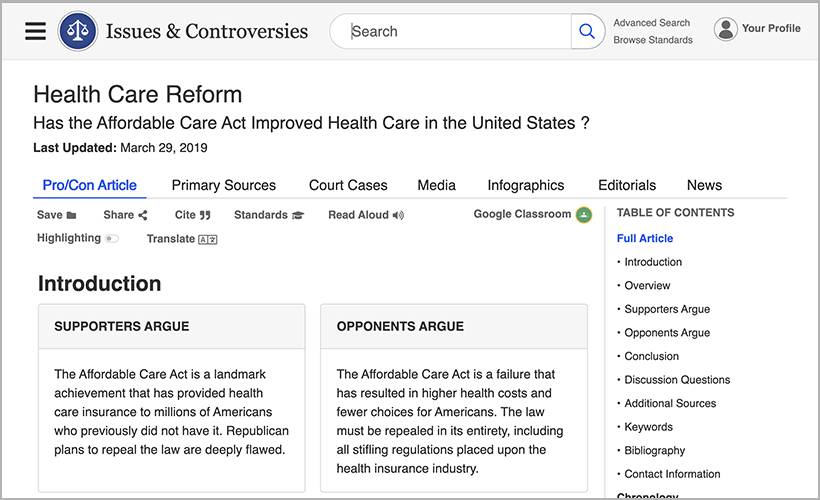
May:
- Mental Health Awareness Month: Social Media and Mental Health: Does Social Media Benefit Its Users?
- International Workers’ Day (May 1): Minimum Wage: Should Congress Raise the Federal Minimum Wage?
- Choose Privacy Week: NSA Surveillance Programs: Should National Security Agency (NSA) Surveillance Programs Continue?
- Endangered Species Day (May 17): De-extinction: Should Scientists Resurrect Extinct Species?
- World No Tobacco Day (May 31): Smoking Bans and the Tobacco Industry: Should the Government More Strictly Regulate the Consumption and Sale of Tobacco Products?
June:
- Pride Month: Gay Rights: Should the Government Take More Steps to Protect Gay Rights?
- National Gun Violence Awareness Month: Gun Control Laws: Should the United States Adopt Stronger Gun Control Laws?
- Black Lives Matter Month: Police Brutality and Reform: Does Policing in the United States Need to Fundamentally Change?
July:
Independence Day (July 4):
- U.S. Politics and the Presidency: Should Presidents Claim Strong Executive Power?
- Electoral College: Should the United States Continue to Use the Electoral College in Presidential Elections?
- Two-Party System: Would More Major Political Parties Benefit the United States?
99th Anniversary of Scopes Trial: Religion in Public Schools: Should Religion Play a Role in Public Schools?
National Whistleblower Day (July 30): WikiLeaks: Does WikiLeaks Serve the Public Good?
August:
- Back-to-School Month: School Uniforms: Should Public Schools Require Uniforms?
- National Inventors Month: Artificial Intelligence (AI): Could AI Pose a Danger to Humankind?
- National Immunization Awareness Month: Mandatory Vaccination: Should Vaccination Be Mandatory?
- National Wellness Month: Mindfulness in the Classroom: Should Public Schools Teach Meditation and Yoga?
Ideas for Using Issues & Controversies in History
- Use the videos to introduce a topic—selected articles include an exciting, original three-minute video that gives essential historical context to the issue and controversy
- Use the discussion questions to spark in-class debate or to inspire research
- Use the printable handouts for review and self-assessment
- Assign the primary sources for context and background
- Encourage critical thinking. Use the “What If?” questions at the end of many articles to pose counterfactual scenarios suggesting how history could have turned out differently
September:
- Afghanistan War: Should Congress Authorize an Attack on Terrorist Targets in Afghanistan?
- Constitutional Convention: Balancing a Strong National Government and States’ Rights
- World War II and “America First”: Should the U.S. intervene in World War II or remain neutral?
- Roman Empire: Should Rome Restore a Republican Form of Government or Become an Empire?
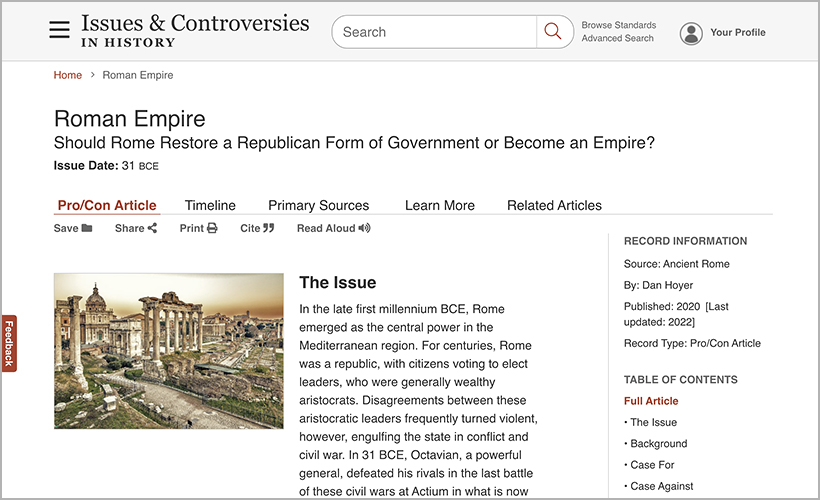
October:
- Columbus’s Voyages to the Americas: How Should His Legacy Be Assessed?
- John Brown’s Raid at Harpers Ferry: Was John Brown a Freedom Fighter or a Terrorist?
- Cuban Missile Crisis: Should the United States Use Force to Remove Soviet Missiles from Cuba?
- Quebec Separatism: Should the Province of Quebec Secede from Canada and Form a Separate Nation?
November:
- 2000 Presidential Election: Fair or “Stolen” Election?
- Kennedy Assassination: Was the President Killed by a Lone Gunman, or Was There a Conspiracy?
- The Bonus Army: Was President Hoover Right to Evict the Bonus Army?
- Opium War: Was Great Britain Justified in Going to War with China?
- The Comanches: Did They Establish an Empire in the American Southwest?
December:
- Pearl Harbor Attack: Who Was Responsible for Failing to Anticipate the Attack?
- Nativism and the Know Nothings: Should the United States Restrict Immigration?
- Bhopal: Who or What Was Responsible for the Bhopal Disaster?
- Australia and Its Policy on Indigenous People: Was Australia’s Policy of Removing Mixed Race Children from Their Families Motivated Mainly by Benevolence or Racism?
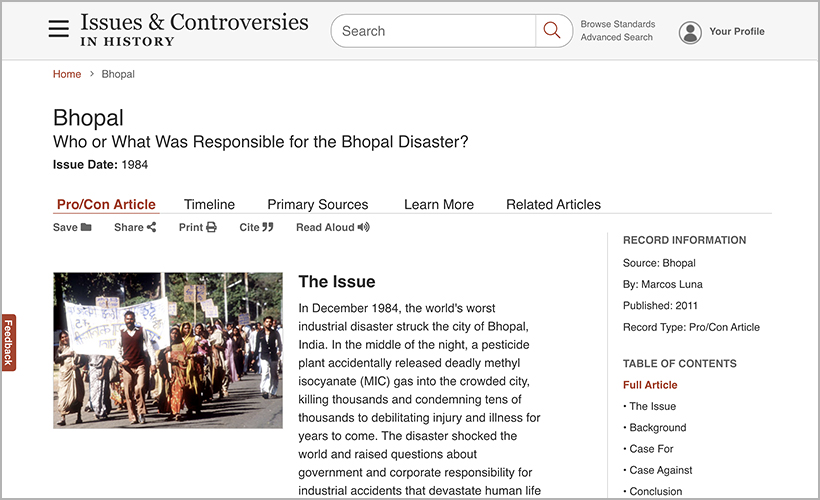
January:
- League of Nations: The Pros and Cons of U.S. Membership
- Prohibition: Is Banning Alcohol a Social Necessity or Restriction of Freedom?
- Keating-Owen Child Labor Act: Should the Federal Government Regulate Child Labor?
- Voyages of Zheng He: Should China End Its Maritime Expeditions?
February:
- Slavery and the American Revolution: Did the American Revolution Significantly Change the Condition and Status of Black Americans?
- Japanese-American Internment: Preservation of National Security or Violation of Japanese Americans’ Rights?
- Black Power Movement: Militancy vs. Compromise in the Fight for Rights
- Yalta Agreement: Did Roosevelt and Churchill Succeed in Achieving the Best Deal Possible?
March:
- Boston “Massacre”: Were British Soldiers or American Colonists to Blame?
- Equal Pay Act of 1963: Should Employers Be Required to Pay Women and Men Equal Wages?
- Equal Rights Amendment: Should the U.S. Constitution Be Amended to Ban Discrimination Based on Sex?
- Irish Independence: Should Ireland Ratify the Anglo-Irish Treaty?
April:
- Mexican-American War: Justified Response to Mexican Aggression or Unscrupulous Land Grab?
- Runaway Slaves and Union Troops: Should Northern Military Forces Accept Fugitive Slaves Who Fled to Union Lines?
- Spread of Early World Religions: Did Missionaries or Merchants Play the Main Role?
- Vietnam War: U.S. Involvement in the Conflict between North and South Vietnam
May:
- Indian Removal Act: Necessary to Protect the Indians or Atrocity Against Them?
- Ten-Hour Workday: Should Massachusetts Legislators Enact a Ten-Hour Day?
- Brown v. Board of Education: Does Racial Segregation of Public Schools Violate the U.S. Constitution?
- Founding of the State of Israel: Should a Jewish State Be Established in the Middle East?
June:
- Reign of Hatshepsut: Ambitious Usurper or Successful Ruler?
- War of 1812: A War of Necessity or of Choice?
- Watergate Affair: Betrayal of American Democracy or Overblown Political Scandal?
- Proposition 6: Should California Voters Pass the Antigay Ballot Measure Known as the Briggs Initiative?
July:
- Declaration of Independence: American Colonies Sever Ties with Great Britain
- Scopes Trial: Can a State Bar Evolution from Being Taught in Public Schools?
- Civil Rights Act of 1964: A Measure to Ensure Equality or a Violation of States’ Rights?
- Roswell Incident: UFO Crash or Harmless Nonevent?
August:
- Haitian Revolution and Human Rights: Did This Uprising Successfully Advance or Ultimately Thwart the Cause of Human Rights?
- Suffrage Movement: Should the Woman Suffrage Movement Adopt Militant Tactics?
- Atomic Bombing of Japan: Barbaric Tactic or Quick Way to End the War?
- Hurricane Katrina: What Was Responsible for the Devastating Flooding of New Orleans?
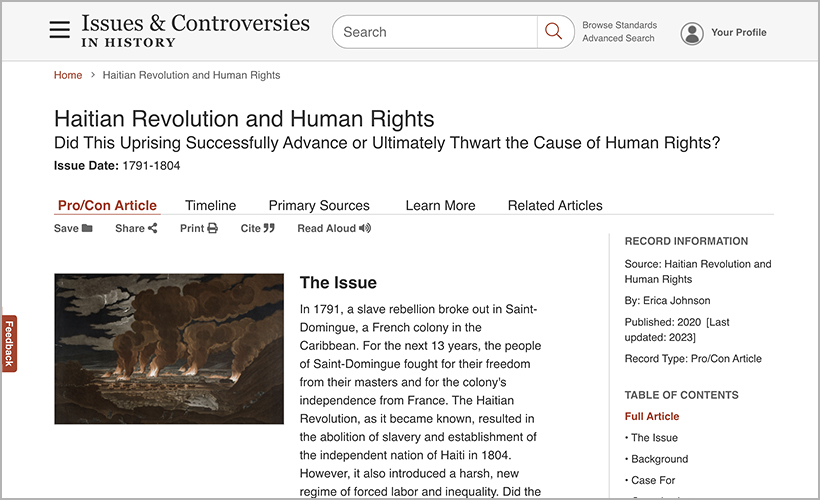
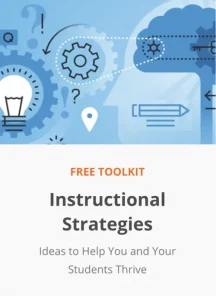 What Is Issues & Controversies?
What Is Issues & Controversies?
The award-winning Issues & Controversies database helps researchers understand today’s crucial issues by exploring hundreds of hot topics in politics, government, business, society, education, and popular culture. Updated weekly, with an extensive backfile, Issues & Controversies offers in-depth articles—each presenting both sides of an issue clearly, coherently, and without bias—made to inspire thought-provoking debates. Its straightforward presentation of the key facts, arguments, history, and current context of today’s most important and timely issues makes the database an ideal resource for research papers, debate preparation, and persuasive writing assignments.
Are you looking for more ideas on how to use Issues & Controversies in the classroom? Check out the “Four Keys to Using Issues & Controversies in Instruction” PDF today!
What Is Issues & Controversies in History?
Issues & Controversies in History places students at the center of the great debates and conflicts in U.S. and world history, exploring the issues as the key players saw them or, in some cases, as historians have interpreted them. This comprehensive reference database delivers dynamic, concise, and balanced coverage of a broad range of topics, from slavery, empire, and revolution to race, gender, economy, and disease, all over the globe. By building a deeper understanding of how historical events and conflicts have influenced U.S. and world history over the past 5,000 years, Issues & Controversies in History is a powerful tool for helping researchers analyze primary sources, answer document-based questions, and prepare for history debates and research projects.
Curious about our Issues & Controversies databases? Why not take a free trial of both?
See also:



